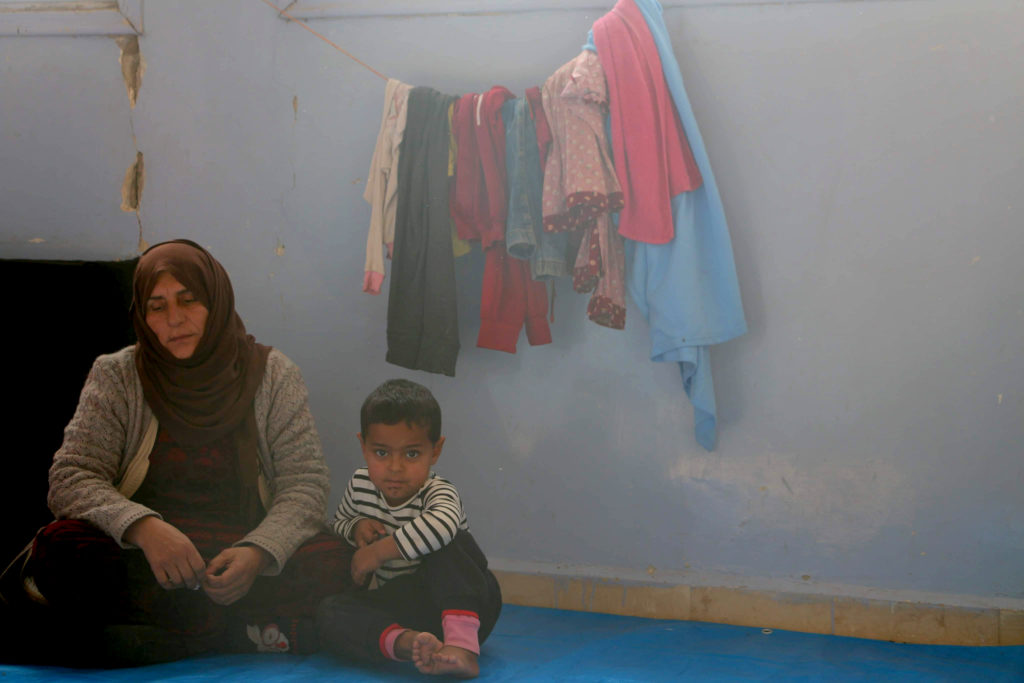“She can’t stand talking with men anymore”
The story of Zainab who escaped from captivity in Serê Kaniyê in an exchange for ransom.
Hamza Hamakid

Juma Sheikho did not expect that the decision to return with his wife to their city Serê Kaniyê (Ras Al-Ain), would be a tragically bad. In addition to the destruction of his house during the Turkish bombing, his fifty-year-old wife, Zainab was subjected to a disaster that left her in a very bad psychological situation that could last for long periods of time.
On the 9th October 2019, Turkey with the participation of Islamic radical factions affiliated with the Syrian opposition, launched a major military invasion of the area between Serê Kaniyê (Ras Al-Ain) and Girê Spî (Tal Abyad) after fierce battles held on long over 120 km on the border between the two cities, and ended with Turkey’s control Over this entire area after the withdrawal of the Syrian Democratic Forces from the city of Serê Kaniyê, according to an agreement between Washington and Ankara.
It was on the third day after the shelling began, when Juma Sheikho decided to take his family out of the city to the southwest, where the villages of the town of Tal Tamr on the Hasaka road, in an attempt to save their lives after the Turkish bombardment targeted the civilians while the Syrian Islamic radical factions were ready to attack the city, where then Serê Kaniyê turned into a real arena for what is known as “street war”.
That afternoon, the fifty-year-old Juma Sheikho with his motorbike started to get his family out in batches, like all the others, who found no way but escaping for fear of their lives. Juma speaks to SHAR magazine: “I took out my family on my motorbike, and I had to run and go back for four times and travel 10 kilometers to get the whole family out,”.
During the Turkish bombing on the city and its countryside, about 150,000 people fled the city during the first days, crossing the countryside of Tal Tamr and arriving to the city of Hasaka, in a scene that embodied one of the most human tragedies in Syria during the eight years of the war, as hundreds of children and women spread outside on the roads, while thousands of them took refuge in schools, some of whom took shelter in the cold and rain with unfinished buildings.
This was done in conjunction with international relief organizations withdrawing their staff from Rojava towards the Kurdistan region of Iraq, which led to a great pressure on the local organizations, which found themselves infront of the responsibility to provide assistance to the IDPs despite the limited capabilities.
The 13th of October marked a tragic turn for Zainab and her family. After two days of reaching safety, she and her husband made a decision to return home to find out what happened to their house. “We have taken the decision to check out our house and to bring some necessary needs, but Zainab’s ambush in an armed faction in the city was not taken into account, fortunately I managed to escape with some other families,” Juma says.
What Juma went through prevented him from sleeping for two weeks, which is the period that his wife “Zainab” spent in detention. The same happened to tens of families from Serê Kaniyê, according to local human rights reports, despite the absence of accurate statistics on this kind of violations. After Juma reached his family, he tried by all possible means to know the fate of his wife, but no avail, until he received messages from the faction which had detained his wife.
“They sent me pictures of Zainab, and demanded a ransom of one million Syrian pounds in exchange for her release,” Juma says, and started to seek to bring the amount of money to send it through brokers to the faction which had detained his wife.

During the period of Zainab’s detention, the man comforted his three children and reassured them that she will be back. “The amount of one million pounds that I sent to the armed faction, I worked hard to collect it, but the return of my wife to can not be compared to any amount of money,” Juma says.
However, the return of Zainab to her family would not end her suffering, as her husband had hoped for, the effects of the period of forced detention on her are far from being forgotten, the horror of the scenes of killing and torturing that she went through in the two weeks, was a nightmare that she could not wake up from till now.
(SHAR magazine was not able to take her testimony, because Zainab was unable to look at the camera while we were trying to take pictures documenting her condition)
“She can’t stand talking to men anymote” her husband Juma says.
Zainab today lives with her family inside the school of Um Hajariya, which is located in the west of the neighborhood of Al-Nashwa in Al-Hasakah, in one room, along with two families who are displaced, amid difficult humanitarian conditions. “How can three families live in one room? These children are out of school. Everything is gone,” Juma explains the situation of his afflicted family.
As for Juma Sheikho, the pain he experienced with his family can not be comlared with his wish to see his wife recovering from her psychological crisis, and overcomes the horrors she experienced in the captivity.
